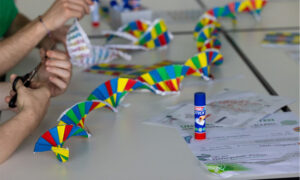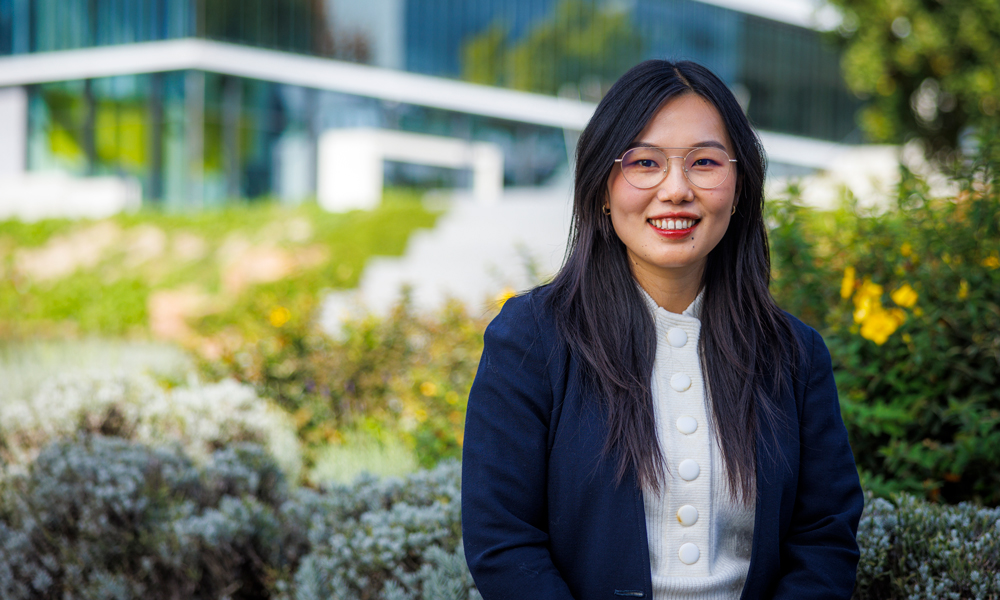
Read the latest Issue
Victoria Yan, Open Science & Research Information Specialist, talks about the importance of open science, the challenges she has faced in her career, and what she enjoys about working at EMBL

EMBL’s Office for Scientific Information Management (OSIM) comprises the Szillárd Library, EMBL Archive and Records, and Open Science Support. They provide services for all EMBL sites. As a part of the Open Science Support team together with Open Access Research Adviser André Sartori and EuropePMC, OSIM supports EMBL researchers in open access publishing and the adoption of open science best practices in-line with EMBL’s Open Science Policy.
In this interview, Victoria Yan, Open Science & Research Information Specialist at EMBL, talks about how OSIM supports open science and her unique career journey.
OSIM provides information and resources on all aspects of EMBL’s Open Science Policy, including open access publications, open data, data management, and open source software. We encourage everyone at EMBL to get in touch with us at any stage of a research project.
Open science can be more than just what gets published at the conclusion of a research project. Adopting FAIR (Findable, Accessible, Interoperable, Reusable) principles, data management, and coding best practices as early as possible can save tremendous amounts of time and effort. They can also make collaborations much more efficient. We can provide training and resources for open science and being FAIR on an individual basis. For research groups, we organise open science training together with Bio-IT and internal training teams.
At the publication stage, we can provide advice on journal policy, licensing and copyright, and our open access agreements with publishers. We help staff to comply with both EMBL’s Open Science Policy and funder open science policies.
The field of open science is very wide and, of course, we rely on collaboration with other experts in the field at EMBL and beyond. We also serve as a hub to guide EMBL staff and fellows to these experts.
The most exciting thing about my work is seeing the transformation of how we do science. It is amazing to see open science taking off globally and how it is being prioritised by EMBL. Sharing the discoveries and work behind a publication amplifies the impact of the research.
I also enjoy collaborating with other institutes and colleagues and sharing practical guidance on how to make research more open. And we are just getting started! I look forward to new open science infrastructure developments and strengthening the open and transparent research culture at EMBL.
The best part of working at EMBL is definitely working with very collaborative and supportive colleagues in OSIM, at EuropePMC, and other departments around EMBL. The Communications department has helped us tremendously with our open science outreach, IT has played a huge role in making our publication management more efficient, our Purchase and Finance colleagues have helped us make a new APC processing workflow run well, and the HR team has helped us so much in our ORCID campaign. And the list goes on. I really appreciate that everyone finds ways to help us achieve EMBL’s open science goals.
The biggest challenge in my career so far has been making a transition from research to open science. During my PhD, I became interested in how the research ecosystem worked, so I took advantage of my fellowship secondment to work with ASAPbio. At ASAPbio, I tracked open peer review innovations and saw the importance of peer review of preprints, especially at the beginning of the pandemic.
My experience at ASAPbio made me realise that I could grow in new ways, thus leading to a turn to open science that has been both challenging and exciting. Seeking out opportunities to explore my new interests and motivations and having great mentors helped me make this transition.
You can find out more about Open Science at EMBL here.
Looking for past print editions of EMBLetc.? Browse our archive, going back 20 years.
EMBLetc. archive